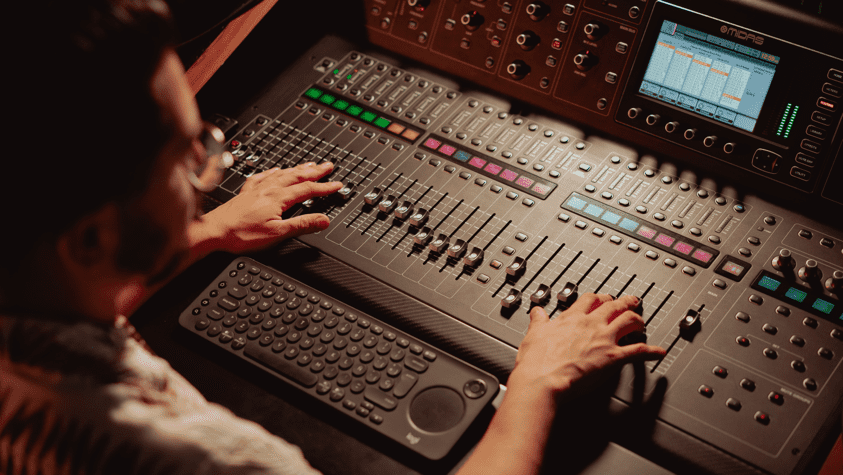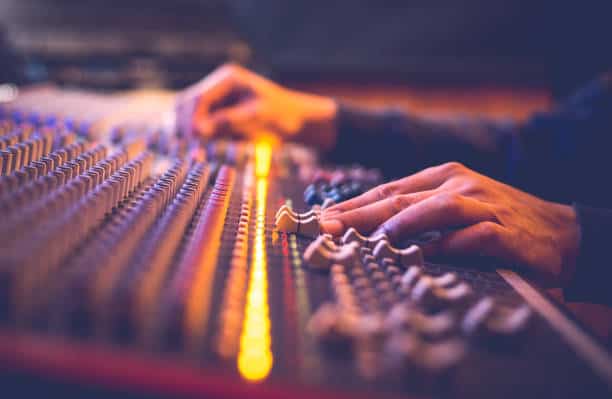If you’ve ever wondered what goes on behind the scenes to create top 40 music recordings, you should speak with audio engineers.
Today’s top musicians wouldn’t sound the way they do if they didn’t collaborate with the industry’s best audio engineers.
So, whether you’re a budding producer or wondering what it takes to become a professional audio engineer. It’s a good idea to learn what audio engineers do to create high-quality recordings.
In this post, we’ll look at the precise responsibilities that an audio engineer performs, the professional path that leads to becoming an audio engineer, and a few situations where you might want to employ one—even if you’re on a tight budget!
What is an audio engineer?
Audio engineers are specialists in the music business that specializes in live audio recording, mixing, post-production, and mastering. An audio engineer is skillful in the creation and completion of recordings.
Typically, audio engineers will have some college education or vocational training at a specialist recording studio. However, many audio engineers are self-taught with the help of a mentor.
What does an audio engineer do?
Audio engineers can be hired to record a wide range of live sound recordings, including symphonic and band performances, sound for cinema and television, field recording, live audio production, and more.
In general, audio engineers are in charge of producing high-quality sound recordings that fulfill the requirements of the contractor, who might be an artist or another media producer.
Audio engineering entails many basic duties; here are a few of the specific chores they’ll do daily.
Maintaining and managing a professional recording studio
To record great sound, you’ll need a professional studio and the ability to operate it.
Audio engineers are in charge of managing the design and construction of their studio, as well as ensuring that it has all of the essential equipment and acoustically treating each of the rooms.
Of course, constructing a professional studio necessitates a large expenditure. Thus, an audio engineer must carefully account for numerous charges while constructing a studio.
Typically, this entails collaborating with a team of engineers to build a company around the studio.
Once the studio is set for recording, it is the responsibility of the chief audio engineer to keep it in excellent working condition and to keep bookings and contracts coming in.
While the business side of running a professional studio may not be the most glamorous aspect of the work. It is undeniably one of the most vital.
You will not continue long if you do not build and manage your studio professionally, or do not regularly book contracts and capture live performances.
Producing quality recordings
The method of capturing the live sound is the most visible aspect of an audio engineer’s employment.
Audio engineers must be well-versed in micing techniques, signal routing, and the ability to determine what type of recording setup is ideal for different live bands.
They must also have certain interpersonal skills to collaborate with producers and artists to make the performances a reality.
Mixing recordings
Once an audio engineer has successfully captured high-quality audio, it is time to take the recordings into the mix studio and begin shaping and molding them into something close to finished.
This necessitates understanding of numerous mixing techniques like EQ, compression, filtering, gain staging, effects, layering, pitch correction, and much more.
Mixing engineers will frequently design a preliminary mix of a single or album and then revise it depending on the artist’s comments and demands.
Mastering the final mix
After a final version of a single or album’s mix is achieved, the audio engineering process concludes with mastering.
This is a technological procedure that polishes each track to make it sound as good as it possibly can on any speaker. It also allows each musician to compete in terms of loudness on streaming services and radio.
Mastering is the final phase since it prepares a mixed track or album to sound as well as it can as a commercial release.
Professional mastering engineers frequently perform this specialized technique with professional audio mastering knowledge.
How to become an audio engineer

Many audio engineers begin their careers as junior engineers at bigger professional studios. They hustle to develop their brand and studio by gradually expanding their portfolio and network.
The key to being a professional audio engineer is to get studio experience. And you should work on a variety of projects, and eventually own, run, and manage your studio.
Start working on your projects as soon as possible. Getting pro-bono experience is sometimes the only way to get your foot in the door; nevertheless, be wary of being taken advantage of.
Of course, studying audio engineering at a recording arts school or university will help your prospects.
Of course, studying audio engineering at a recording arts school or university won’t hinder your prospects and will provide you with opportunities to grow your network. However, because you have a degree or certificate doesn’t imply you can get work immediately out of college.
When to hire an audio engineer
If you’re a new producer wondering whether it’s worth your time and money to employ an engineer. You now have a better notion of what services they provide.
Of course, audio professionals provide their services at a range of prices. Top-tier engineers may charge $300 or more per hour, while others may charge by the track or revision.
If you decide to employ an audio engineer, you should have a strategy and know exactly what you require. It is preferable for everyone if there is a clear focus on the tasks that you should do.
You should expect a reduced fee for services that you can do remotely, like mixing, where you can just send over a.zip file with recordings.
However, if you’re going into a studio and recording with professional equipment, you should spend a little more money.
Finding a professional audio engineer might be difficult, especially if you don’t reside in a big metropolitan area.
Fortunately, there are internet markets that make it quite simple to network and interact with hundreds, if not thousands, of audio professionals worldwide.
The professional touch
Writing and creating music is difficult. You should not expect to know all there is to know about recording, producing, and completing a track professionally.
There’s no shame in employing someone to assist you in completing your tracks. Why not give your creativity the respect it deserves and hire a professional audio engineer?
It takes time and determination to learn the ins and outs of audio engineering. If you’re just starting, working on your tracks—and occasionally hiring specialists when needed—is the greatest way to go.
Making music is a process, and learning how to record songs and obtain a nice sound takes time.
Never stop learning, and don’t be afraid to ask for help when you need it!

